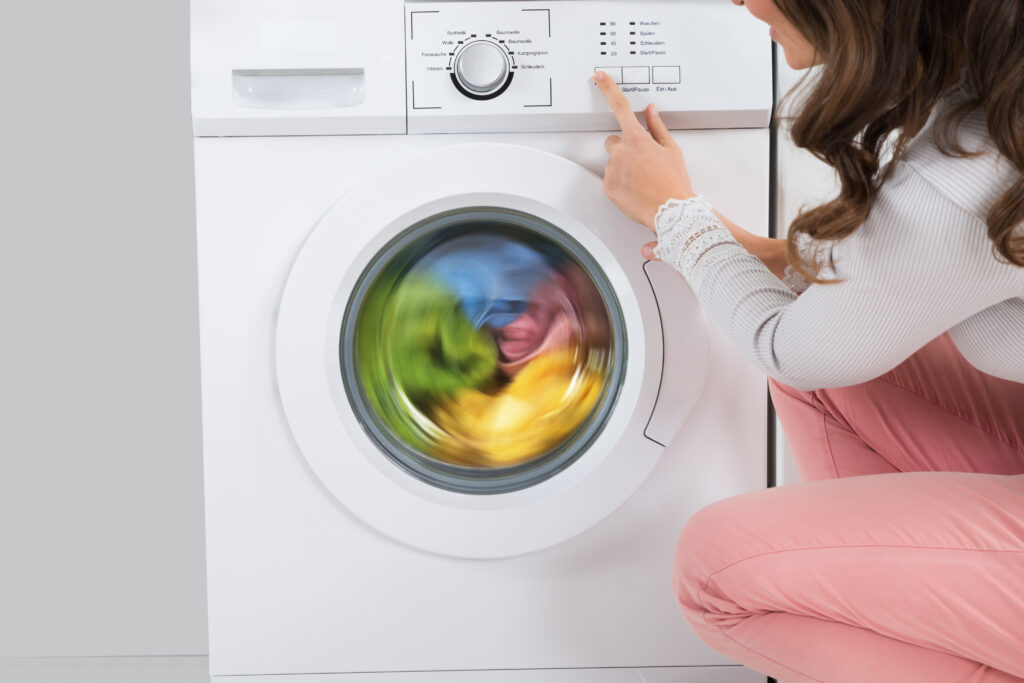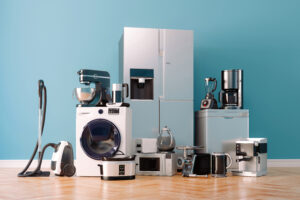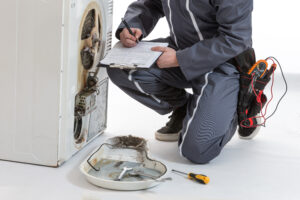
*Updated December 29th, 2025
Modern appliances make our lives easier—but replacing a home appliance can be expensive. The good news: with a few simple appliance maintenance habits, you can extend the life of your systems, prevent an unexpected breakdown, and keep your household running smoothly.
Whether it’s your refrigerator, dryer, dishwasher, or washing machine, these tips to extend the lifespan of your home appliances can help them run better, last longer, and even improve energy efficiency over time.
Tips and Tricks to Help Your Home Appliances Last Longer
Your appliance lineup works hard behind the scenes every day—keeping food fresh, clothes clean, and dishes sparkling. But over time, buildup, overload, and skipped regular maintenance can shorten the lifespan of even the best home appliance.
Here are practical maintenance tips and simple routines that can extend their lifespan and protect the life of your appliances.
1. Don’t Overload Your Washer and Dryer
Your washing machine and dryer work hard to keep your clothes clean and dry, but overload can strain the motor and work harder than it should—leading to early replacement. A stuffed washer also means clothes don’t rinse as well, and the dryer may take longer, increasing energy costs.
To extend the lifespan of these appliances, follow the manufacturer’s load recommendations and avoid stuffing the drum full.
2. Clean the Dryer Vent and Lint Trap
A clogged vent or lint trap doesn’t just reduce performance—it can create a serious fire hazard. Lint buildup restricts airflow, causing the dryer to run hot and lead to overheating.
-
Clean the lint trap after every use
-
Schedule an external vent cleaning at least once a year
This is one of the simplest ways to protect your appliances, reduce unexpected breakdowns, and extend the life of your dryer.
3. Wipe Down Refrigerator Coils
A refrigerator can lose efficiency quickly if refrigerator coils (or condenser coils) are coated in dust. Dirty coil surfaces make the unit work harder, driving up energy costs and potentially shortening the appliance lifespan.
Unplug the fridge and use a vacuum or coil brush to gently clean the coils every few months—or at least twice a year. This proper maintenance helps your refrigerator run efficiently and can add years to their lifespan.
4. Keep the Refrigerator Door Sealed Tight
A worn gasket can let cold air leak out, forcing your refrigerator to cycle more often. Clean the gasket with warm water and check for cracks or looseness.
A tight seal helps the unit help it run efficiently, reduces strain, and supports the overall lifespan of your appliance.
5. Use the Right Amount of Detergent
Too much detergent in a washing machine or dishwasher can cause residue buildup, foul odors, and even clog internal parts over time—issues that can shorten the lifespan of your appliance.
Use the recommended amount and choose high-efficiency detergent when appropriate. This small change can go a long way toward helping appliances last longer.
6. Clean Your Washing Machine Monthly
Even the washer needs a refresh. Detergent, hard water, and fabric additives can build up inside and lead to odors and mold.
Run a hot cycle with water and vinegar or a washer cleaner at least once a month, then wipe down the drum and gasket. Regular cleaning is one of the most effective forms of maintenance and care for water-using appliances.
7. Don’t Forget the Dishwasher Filter
Food particles can collect in your dishwasher filter, reducing cleaning performance and causing drainage issues. Every month or so, remove the filter, rinse it, and clear any debris.
Keeping this clean appliance routine helps your dishwasher perform better, prevents a surprise breakdown, and can extend the lifespan of the unit.
8. Clean Spills Quickly
Whether it’s a fridge shelf, microwave interior, or the bottom of your dishwasher, letting a spill sit too long leads to sticky residue and buildup. Quick wipe-downs also help prevent stains and odors.
A few minutes of regular cleaning after messes is one of the easiest care tips to keep your appliances in good shape.
9. Consider a Home Warranty
If you want an extra layer of protection, a home warranty may help cover repairs or replacements when a major appliance fails. This can be especially helpful for older units or appliances like refrigerators, dishwashers, and washing machines that may be nearing the end of their lifespan.
A warranty won’t replace good appliance maintenance, but it can reduce the financial hit of costly repairs and repairs and replacements when something goes wrong.
Final Thoughts: Extend the Life of Your Appliances
A few minutes each month can make a real difference. These appliance maintenance tips to extend the lifespan of home appliances are simple, budget-friendly, and effective—helping reduce breakdown risk, improve longevity, and keep your home operating smoothly.
With proper maintenance, you can extend the lifespan of your refrigerator, dryer, dishwasher, and washing machine, and avoid premature replacement.
FAQ
What is the average lifespan of a home appliance?
Most common household appliances last about 8 to 15 years, depending on usage, environment, and regular maintenance.
Do old appliances last longer?
Older models can be very durable, but modern units may offer better energy efficiency. Either way, appliance maintenance can help extend the life of both old and new equipment.
How long do refrigerators last?
A typical refrigerator lasts 10 to 20 years. Cleaning refrigerator coils and maintaining door seals can help prevent early replacement and extend the lifespan.

Anna has over six years of experience in the home services and journalism industries and serves as the Content Manager at MyHomePros.com, specializing in making complex home improvement topics like HVAC, roofing, and plumbing accessible to all. With a bachelor’s degree in journalism from Auburn University, she excels in crafting localized, comprehensive guides that cater to homeowners’ unique needs. Living on both coasts of the United States has equipped her with a distinctive perspective, fueling her passion for turning any house into a cherished home through informed, personalized decision-making.
Connect with top-rated local contractors who can help you with siding, roofing, HVAC, windows, and more. Get free quotes from verified professionals in your area today.







